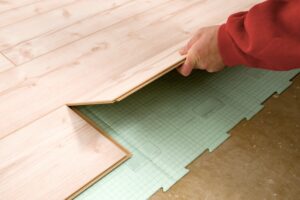- 2 min reading time
Verbraucherschutz warnt: Finger weg von PVC
The Ministry of Consumer Protection in North Rhine-Westphalia is issuing an urgent warning about toys containing PVC in the coming Christmas period. Products should always be labelled "PVC-free" and "phthalate-free". Seals of approval and independent tests offer guidance, but consumers should still take a close look and inform themselves well, advises the ministry. However, this warning does not only apply to toys. Small children in particular spend a lot of time in their own homes and have intensive contact with the domestic floor. Nevertheless, an alarming number of flooring manufacturers use harmful additives such as PVC. Caution is advised when Choice of flooring in the children's room.
Only PVC-free is safe
For years Criticism of floor coverings with PVC. However, there has not yet been a ban, despite the proven effects on health. Plasticisers are added to most products, making the floor covering flexible. The chemical substances escape over time and enter the respiratory tract via the indoor air or the hormone and immune system via the skin through use close to the body. There is a health risk for children, animals and adults and this has been proven in several studies.
It is not for nothing that PVC is being scrutinised by the European chemicals regulation REACH and could face an EU-wide ban. Until then, consumers are on their own and need to find out exactly what products are in their household, as not every product containing PVC is labelled as such. The best orientation for this is provided by trustworthy seals and test reports from the relevant institutes.
How can I protect myself from PVC?
The consumer advice centre advises that floor coverings should be tested by renowned institutions. Specifically, the ministry mentions the Blue Angel, the German Ecolabel and the eco-INSTITUT. This is one of the most experienced German laboratories for indoor analyses with a focus on emissions and pollutants. Both organisations refuse to award their seal to any floor coverings with PVC for good reason. For consumers, this means that they can buy products with one or both seals without hesitation, safe in the knowledge that they do not contain PVC, plasticisers or phthalates. Trustworthy seals are the best option for ruling out products that are harmful to health, as there is no mandatory labelling of ingredients in floor coverings. This means that even a designer floor can turn out to be a PVC product.
Our floor coverings were created because there are not enough good and sustainable alternatives to PVC products. CERAMINⓒ is our own material, which is made from recycled plastic and makes our wall and floor coverings robust and recyclable. And completely free of harmful substances such as PVC, plasticisers or phthalates. This has been independently confirmed by the Blue Angel and the eco-INSTITUT with their seals on our products.




